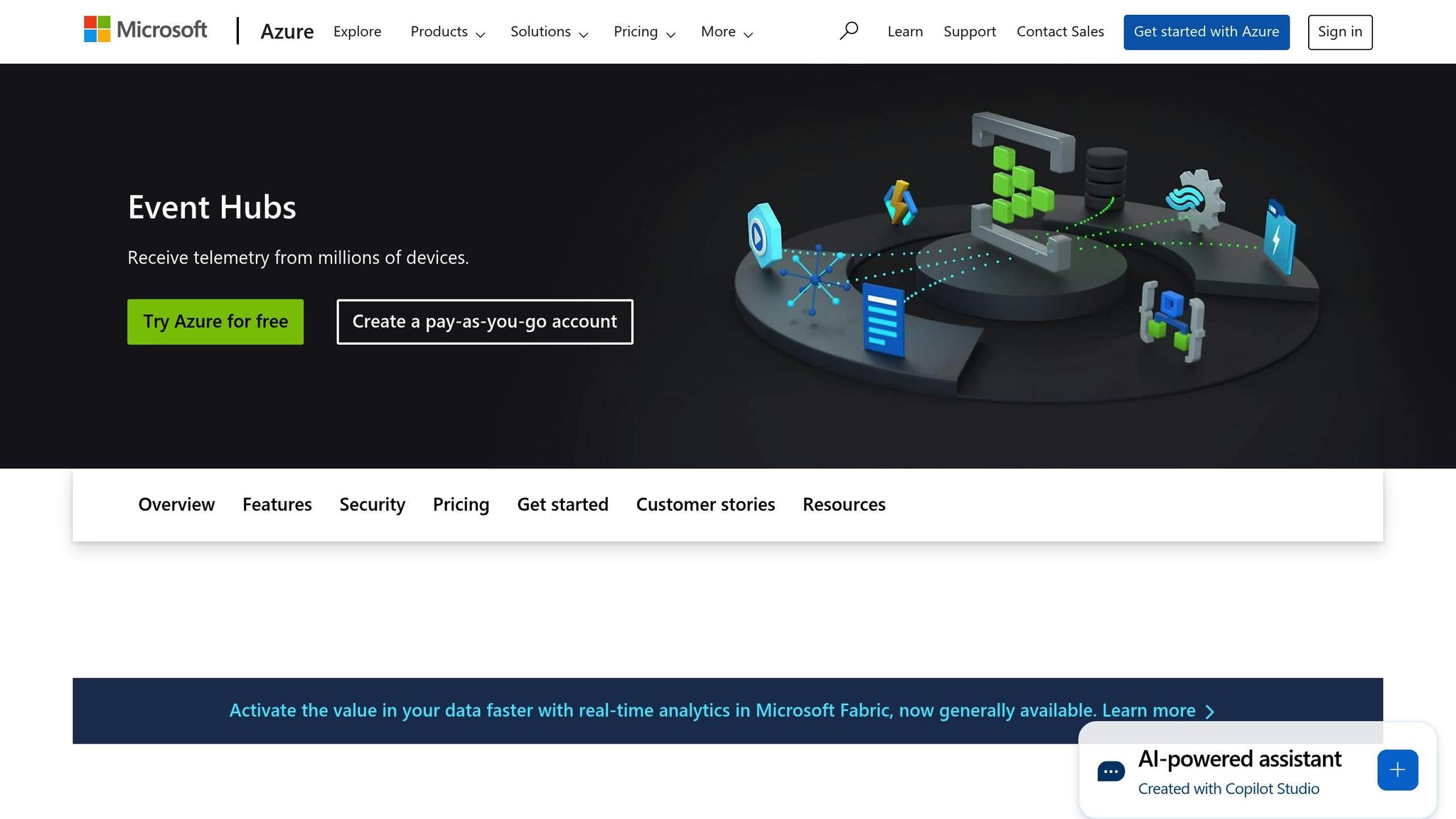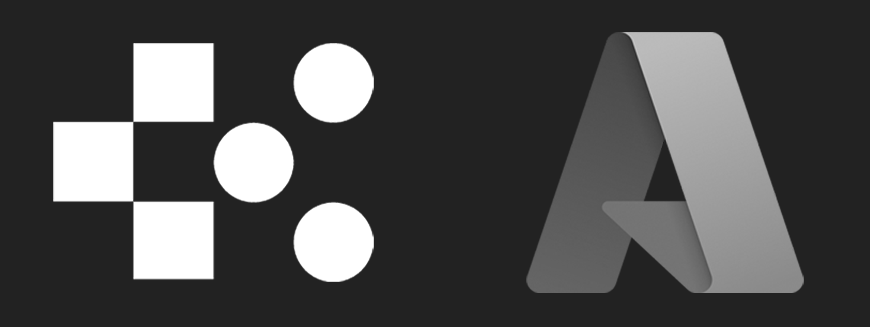Azure Event Hubs vs Apache Kafka: Key Differences
Explore the key differences between two leading event streaming platforms, highlighting their management, scalability, and integration strengths.

Choosing between Azure Event Hubs and Apache Kafka depends on your needs for scalability, integration, and management. Here’s a quick breakdown:
- Azure Event Hubs: A fully managed service designed for real-time data ingestion, tightly integrated with Azure services. It simplifies scaling, reduces operational overhead, and offers predictable, consumption-based pricing. Ideal for small to medium-sized businesses (SMBs) already using Azure.
- Apache Kafka: A self-managed, open-source platform offering flexibility, platform independence, and fine-grained control over configurations. It's better suited for organisations needing custom setups or operating outside specific cloud ecosystems.
Quick Comparison
| Feature | Azure Event Hubs | Apache Kafka |
|---|---|---|
| Management Model | Fully managed (PaaS) | Self-managed |
| Integration | Native Azure services | Platform-agnostic |
| Scaling | Automatic | Manual |
| Cost | Consumption-based | Infrastructure and operational |
| Security | Built-in Azure tools (e.g., RBAC) | Custom configuration required |
| Storage | Tiered retention up to 90 days | Custom retention and tiering |
| Performance | ~10ms latency, 1.8M events/sec | 20-80ms latency, 2M events/sec |
Key takeaway: Choose Azure Event Hubs for ease of use and integration with Azure. Opt for Apache Kafka if you need flexibility and platform independence. Both platforms excel in handling real-time data, but their management and scaling approaches differ significantly.
Kafka vs Azure Event Hubs: Best Streaming Tool for Cloud Stack #Kafka #EventHubs #CloudStreaming

Architecture Fundamentals
The core architecture of Azure Event Hubs and Apache Kafka highlights their differing approaches to event streaming, particularly in how they handle management, partitioning, and storage.
Service Management Models
Azure Event Hubs operates as a fully managed Platform-as-a-Service (PaaS), taking infrastructure management off your plate. With this setup, there’s no need for manual configurations, letting organisations zero in on business priorities instead of worrying about the backend.
On the flip side, Apache Kafka demands hands-on operational involvement. Here's a quick comparison of their management aspects:
| Management Aspect | Azure Event Hubs | Apache Kafka |
|---|---|---|
| Maintenance Requirements | Minimal operational overhead | Regular maintenance and tuning needed |
| Monitoring Integration | Built-in Azure Monitor integration | Requires custom monitoring solutions |
While these management models define operational ease, their partitioning strategies play a key role in scalability.
Data Partition Methods
Azure Event Hubs simplifies scaling with automated throughput units (TUs) or processing units (PUs), capable of handling up to 1 MB/s per partition for real-time data ingestion. The system automatically manages partition allocation and scaling, requiring little user intervention.
Apache Kafka, on the other hand, supports up to 2 million partitions, offering fine-grained control over data distribution. However, this flexibility comes with added responsibility. Users must manually handle monitoring, load balancing, partition configurations, and reassignments when scaling.
Partitioning is just one piece of the puzzle. The two platforms also take different approaches to data storage and backup.
Data Storage and Backup
Azure Event Hubs employs a tiered retention model:
- Standard tier: Retains data for up to 7 days.
- Premium and Dedicated tiers: Extend retention to as long as 90 days.
Additionally, Event Hubs Capture enables automatic archiving to Azure Storage or Azure Data Lake, ensuring long-term data preservation with minimal effort.
Kafka, starting with version 3.6.0, introduced tiered storage, which allows organisations to:
- Scale compute and storage independently.
- Set custom retention periods.
- Use log compaction for key-based retention.
- Maintain redundant copies of topic data and cluster configurations.
"Event Hubs is a real-time event stream engine and isn't designed to be used instead of a database and/or as a permanent store for infinitely held event streams".
This distinction between the two platforms is crucial when designing systems that require long-term data storage alongside real-time processing. It influences how organisations shape their event streaming strategies, depending on their specific needs and goals.
Platform Connectivity
Connectivity is a cornerstone that sets these platforms apart, building on their core architectural principles.
The way Azure Event Hubs and Apache Kafka handle integration and protocols showcases their unique approaches to connecting with services and managing data flows.
Azure Integration vs Open Platform
Azure Event Hubs offers tight integration within the Azure ecosystem. It connects natively to tools like Azure Stream Analytics and Azure Data Explorer, making it easier to process data in real time. This is especially useful for organisations already invested in Azure, as it simplifies the setup of data workflows.
| Integration Aspect | Azure Event Hubs | Apache Kafka |
|---|---|---|
| Native Ecosystem | Azure services integration | Platform-independent |
| Management Overhead | Minimal setup required | Requires manual configuration |
| Third-party Support | Connectors and APIs | Extensive connector ecosystem |
| Enterprise Adoption | Azure-focused organisations | Used by 80% of Fortune 100 companies |
On the other hand, Apache Kafka takes a platform-agnostic approach. It uses Kafka Connect to integrate with a wide range of systems, including databases, cloud storage, Elasticsearch, message queues, and custom applications. This flexibility makes it a go-to option for organisations seeking independence from specific cloud ecosystems.
Both platforms excel in enabling secure and efficient data workflows, but their integration styles cater to different organisational needs.
Communication Protocols
Azure Event Hubs supports a variety of communication protocols, including:
- AMQP (Advanced Message Queuing Protocol)
- Native support for the Apache Kafka protocol
- HTTPS for REST API access
The native support for Kafka protocols is particularly beneficial for organisations transitioning from self-managed Kafka clusters. It allows existing Kafka applications to connect without requiring code changes, easing the migration process.
When it comes to security, Azure Event Hubs enforces strong measures by default. It uses TLS encryption for all data in transit and offers features like OAuth 2.0 authentication, Shared Access Signatures (SAS), and Role-Based Access Control (RBAC). In contrast, Apache Kafka requires additional configuration and third-party tools to achieve a similar level of encryption and authentication.
These differences highlight how each platform balances ease of use, flexibility, and security, giving organisations the tools to choose what suits their needs best.
Speed and Scale
When it comes to speed and scalability, Azure Event Hubs and Apache Kafka each offer distinct approaches tailored to different needs.
Message Processing Speed
Performance testing highlights the strengths of both platforms. Azure Event Hubs Premium consistently achieves end-to-end latency of about 10ms or less for both Kafka and AMQP workloads. These results are supported by test data from.
| Performance Metric | Azure Event Hubs Premium | Apache Kafka |
|---|---|---|
| Maximum Throughput | 1.8 million events/second (100 PUs) | 2 million events/second (3-node cluster) |
| Typical Latency | ~10ms or less | 20-80ms (variable) |
| Infrastructure Required | Single endpoint | Multiple broker endpoints |
"Azure Event Hubs, with its high throughput and low latency, is a perfect fit for building real-time data streaming and processing applications. Its integration with other Azure services also makes it easy to build end-to-end solutions." – Prashant Sharma, Director of Cloud Engineering, HCL Technologies
These figures demonstrate how both platforms handle high-performance demands, setting the stage for a closer look at their scaling strategies.
Scaling Methods
Azure Event Hubs simplifies scaling with its automated approach. Its auto-inflate feature adjusts capacity dynamically based on workload requirements. Each throughput unit (TU) delivers:
- 1 MB/s ingress (or 1,000 events per second)
- 2 MB/s egress
- Automatic scaling without the need for manual intervention
For larger workloads, dedicated Event Hubs clusters can handle between 100 and 250 MB/s per Capacity Unit, making them well-suited for data streams exceeding 50 MB/s.
"Kafka has become the de facto standard for streaming data processing in enterprises, providing a reliable and scalable way to move data between systems." – Jay Kreps, Co-founder and CEO of Confluent
On the other hand, Apache Kafka requires a more hands-on approach to scaling, including:
- Adding brokers manually to expand the cluster
- Rebalancing partitions
- Configuring and managing settings manually
- Relying on in-depth expertise to optimise performance
These differences make it easier for businesses, particularly SMBs, to choose the platform that aligns best with their operational needs and technical capabilities.
SMB Cost Analysis
For small and medium-sized businesses (SMBs) planning their data streaming infrastructure, getting a handle on the costs of Azure Event Hubs versus Apache Kafka is essential. Here's a breakdown of their pricing models and how they impact long-term expenses.
Direct vs Indirect Costs
Azure Event Hubs uses a pricing model based on throughput units (TUs) and event volume. For instance, a 5-TU setup costs approximately $153 (£122) per month. On the other hand, Apache Kafka's expenses are less straightforward, involving costs for hardware, ongoing maintenance, and staffing. These differences are key to understanding how each platform scales financially over time.
Growth and Scaling Costs
When it comes to growth, the financial impact varies significantly. Azure Event Hubs offers predictable scaling with its auto-inflate feature, keeping costs relatively linear. In contrast, a self-hosted Kafka setup demands additional investments in infrastructure as usage increases.
3-Year Cost Outlook
Looking ahead, the total cost of ownership (TCO) for Azure Event Hubs remains consistent and predictable, making it a strong choice for SMBs with long-term plans. Self-hosted Kafka, however, tends to see rising operational and infrastructure costs as businesses expand. This difference becomes especially noticeable as organisations scale up their operations.
"Get the best value at every stage of your cloud journey with simple pricing and predictable, transparent costs." – Microsoft Azure
To manage costs effectively, SMBs should consider the following:
- Opt for the Standard tier with auto-inflate to maintain predictable spending.
- Regularly monitor throughput unit usage to avoid paying for unused capacity.
- Archive events to more affordable storage options to reduce overall expenses.
For more tips on keeping costs under control, check out Azure Optimisation Tips, Costs & Best Practices at Azure Critical Cloud.
Security Features
When comparing the security features of Azure Event Hubs and Apache Kafka, it's clear that they take different approaches to meet the needs of regulated small and medium-sized businesses (SMBs).
Access Control Systems
Azure Event Hubs leverages Microsoft Entra ID to implement OAuth 2.0 for centralised authorisation. This setup supports:
- Role-Based Access Control (RBAC) for streamlined permissions management.
- Shared Access Signatures (SAS) to grant limited access to resources.
- Network security via Private Endpoints and VNet service endpoints for enhanced data protection.
On the other hand, Apache Kafka relies on manual security configurations. Here's a quick comparison of their key access control features:
| Security Feature | Azure Event Hubs | Apache Kafka |
|---|---|---|
| Authentication | Built-in OAuth 2.0 | SASL mechanisms (PLAIN, SCRAM, Kerberos) |
| Authorisation | Native RBAC | Manual ACL configuration |
| Network Security | Built-in Private Endpoints | Custom network configuration |
| Monitoring | Azure Monitor integration | Manual monitoring setup |
These differences highlight the ease of use Azure Event Hubs brings to access control, while Apache Kafka requires more manual effort to achieve similar levels of security.
Industry Standards
Azure Event Hubs stands out for its comprehensive compliance with industry standards, offering features such as:
- Azure Storage Service Encryption (SSE) and TLS encryption for secure data transmission.
- Customer-managed keys (CMK), integrated through Azure Key Vault, for added control over encryption.
- Infrastructure encryption to safeguard data at multiple layers.
- Regulatory compliance tools accessible via Azure Policy.
Additionally, Azure Event Hubs supports both system-assigned and user-assigned managed identities, making it easier to manage secure environments. Automated compliance reporting through Azure Monitor further simplifies maintaining regulatory standards.
In contrast, Apache Kafka requires more technical expertise to set up comparable security measures, including:
- SSL/TLS encryption for protecting data in transit.
- Access control lists (ACLs) for granular topic-level security.
- Integration with external key management solutions, such as HashiCorp Vault, for encryption management.
As of 25 February 2025, Azure Event Hubs added another layer of protection by disabling public network access by default. This change enhances security without requiring additional setup, making it an attractive option for organisations prioritising simplicity and compliance.
Best-Fit Scenarios
When choosing between Azure Event Hubs and Apache Kafka, it’s essential to consider cost, security, and specific requirements. Here’s a closer look at how these platforms perform in different scenarios for small and medium-sized businesses (SMBs).
Data Analysis Pipelines
Azure Event Hubs excels in real-time analytics, seamlessly integrating with tools like Azure Synapse and Power BI. It offers automated scaling and requires minimal operational effort. On the other hand, Apache Kafka provides flexibility with custom processing frameworks and platform independence, making it suitable for more complex, stateful stream processing tasks.
Event Hubs simplifies real-time analytics, helping businesses improve data visualisation and decision-making. In contrast, Kafka demands more custom setups. Here’s how their key features compare:
| Feature | Azure Event Hubs | Apache Kafka |
|---|---|---|
| Analytics Integration | Azure Synapse, Power BI | Apache Spark, Flink |
| Management Overhead | Managed | Self-managed |
| Scaling Complexity | Automatic | Manual |
IoT Data Processing
Azure Event Hubs demonstrated its scalability during a test involving Johnson Controls’ GLAS Smart Thermostat, which processed data from 20,000 IoT devices (both simulated and real). This platform offers several advantages:
- Simplified device integration: Built-in support for IoT Hub and IoT Edge
- Automatic failover: 99.95% SLA with disaster recovery included
- Streamlined security: Integrated Microsoft Entra ID authentication
Apache Kafka, on the other hand, shines with its customisation options and flexibility:
- Fine-grained control: Extensive configuration capabilities
- Flexible deployment: Options for on-premises or cloud setups
- Extensive community support: A large ecosystem of tools and resources
While Event Hubs is a strong choice for IoT data processing, Kafka’s flexibility makes it appealing for broader use cases, such as internal service communication.
Service Communication
When it comes to service-to-service communication, the choice often depends on existing infrastructure and operational expertise. Azure Event Hubs offers:
- Ordered messaging: Ensures sequential delivery within partitions
- Native integration: Easily connects with other Azure services
- Simplified monitoring: Built-in support through Azure Monitor
One example of its effectiveness is a retail analytics platform that reduced operational costs by 40% and improved event processing latency by 15% after switching to Azure Event Hubs Kafka.
In comparison, Apache Kafka provides more flexibility with features like:
- Log-based commits: Reliable message storage
- Multi-cluster replication: Boosts reliability across systems
- Custom routing: Advanced options for message delivery
For SMBs operating within the Azure ecosystem, Azure Event Hubs stands out for its ease of integration and management. However, organisations prioritising platform independence and customisation may prefer Kafka’s adaptable approach.
Conclusion
The comparison between Azure Event Hubs and Apache Kafka reveals clear strengths tailored to different business needs. Deciding between the two largely hinges on your specific requirements, technical capabilities, and budget.
Azure Event Hubs stands out as a strong contender for small to medium-sized businesses, with 66.7% of SMB reviews favouring this platform. Its appeal lies in its seamless integration with the Azure ecosystem and its managed service model, which simplifies operations and offers dependable support.
On the other hand, Apache Kafka shines for enterprises prioritising customisation and platform independence. It's worth noting that over 80% of Fortune 100 companies rely on Kafka, leveraging its ability to handle massive data loads - managing hundreds of megabytes of reads and writes per second.
When it comes to pricing, Azure Event Hubs provides predictable, tiered options, making it easier to plan costs. Kafka, however, offers more flexible deployment models, though costs can vary depending on the chosen setup. This difference reflects their distinct approaches to service delivery.
The importance of event streaming platforms in today’s businesses cannot be overstated. As Apache Kafka aptly describes:
"Event streaming is the digital equivalent of the human body's central nervous system".
For SMBs already embedded in the Azure environment, Event Hubs offers a straightforward and reliable solution, supported by Azure's robust services. However, organisations seeking extensive customisation and willing to invest in technical expertise may find Kafka’s flexibility and performance more suited to their needs.
Ultimately, your choice should align with your organisation’s existing infrastructure, technical resources, and long-term goals. If immediate Azure integration is a priority, Azure Event Hubs is an ideal fit. For those who value platform independence and advanced customisation, Kafka offers unparalleled capabilities.
For additional insights on maximising your Azure investment - whether it’s managing costs, optimising architecture, or enhancing security - check out Azure Optimization Tips, Costs & Best Practices.
FAQs
What should I consider when deciding between Azure Event Hubs and Apache Kafka for my business?
When deciding between Azure Event Hubs and Apache Kafka, it’s essential to weigh factors like management, integration, and cost.
Azure Event Hubs stands out as a fully managed service, which means businesses can skip the hassle of managing and maintaining infrastructure. In contrast, Apache Kafka often requires more hands-on involvement, as it typically involves self-hosting and managing clusters - something that demands both time and expertise.
For organisations already invested in the Azure ecosystem, Event Hubs offers smooth integration with other Azure services, streamlining workflows and reducing setup time. While Kafka is incredibly versatile, connecting it to various tools and platforms might require extra configuration and effort.
Finally, let’s talk about cost. Event Hubs generally provides a more predictable pricing structure, making it appealing for small and medium-sized businesses looking to keep expenses under control. Meanwhile, Kafka’s costs can vary widely depending on the infrastructure and resources needed to keep it running smoothly. Carefully consider these factors to ensure your choice aligns with your business’s priorities and resources.
What are the benefits of Azure Event Hubs' integration with Azure services compared to Apache Kafka's platform independence?
Azure Event Hubs connects effortlessly with various Azure services like Azure Stream Analytics, Azure Functions, and Power BI. This setup supports real-time analytics, smooth data processing, and the creation of serverless architectures. For businesses already within the Azure ecosystem, it reduces latency and simplifies operations.
In contrast, Apache Kafka stands out with its ability to run on multiple platforms, making it adaptable to different environments. This flexibility and scalability appeal to organisations wanting to avoid being tied to a single vendor and retain full control over their infrastructure.
What are the cost differences between Azure Event Hubs and Apache Kafka for small and medium-sized businesses?
The cost of using Azure Event Hubs versus Apache Kafka varies based on factors like usage, infrastructure, and management requirements.
With Azure Event Hubs, the pricing operates on a pay-as-you-go basis, mainly determined by throughput units and data ingestion. For instance, the basic tier starts at around £0.019 per throughput unit per hour, with extra fees for data retention and data ingress. This pricing model is highly scalable, making it appealing for small and medium-sized businesses (SMBs) that want to avoid hefty upfront costs. However, costs can climb significantly as data volumes increase.
On the other hand, Apache Kafka is open-source software, meaning it’s free to use. But there are operational costs to consider, including hosting, infrastructure, and hiring skilled personnel to manage it effectively. If you opt for a managed Kafka service, these expenses can rise further, potentially leading to a higher total cost of ownership despite the software itself being free.
For SMBs, the decision between these two often hinges on factors like available technical expertise, the volume of data they handle, and their overall budget.




